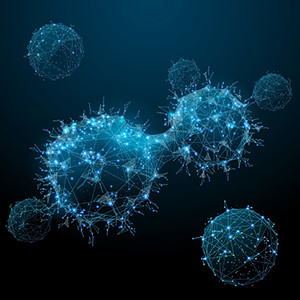Preclinical studies have provided the first evidence that cellular immunotherapy for B-cell cancers could ultimately become an off-the-shelf product, capable of being uniformly manufactured in large quantities. The product—FT596—is among the first cellular immunotherapies to be based on off-the-shelf natural killer (NK) cells and is the first cellular immunotherapy to be genetically engineered to contain three active antitumor components. More information about this treatment was presented by Goodridge et al at the 2019 American Society of Hematology (ASH) Annual Meeting & Exposition (Abstract 301).
“We have taken the concept of traditional pharmaceutical drug development and applied it to cellular therapy,” said senior author Bob Valamehr, PhD, of Fate Therapeutics.

Photo credit: Getty
In early trials, FT596 demonstrated comparable ability to kill cancerous white blood cells vs standard chimeric antigen receptor (CAR) T cells, and when combined with rituximab, killed cancerous white blood cells that were no longer responding to standard CAR T-cell therapy due to loss of the CD19 antigen target.
The U.S. Food and Drug Administration (FDA) approved an investigational new drug application for FT596 in September 2019, and a first-in-human phase I clinical trial for the treatment of B-cell lymphoma and chronic lymphocytic leukemia is forthcoming. The primary purpose of this trial will be to assess the safety and activity of FT596 in patients.
Creation of FT596
The process of creating FT596 begins with human induced pluripotent stem cells that are uniquely capable of unlimited self-renewal and can differentiate into more than 200 types of human cells. The induced pluripotent stem cells are genetically engineered, after which a single clone (genetically engineered cell) is selected and multiplied in the laboratory to create a master engineered cell line that can be repeatedly used to generate cancer-fighting immune-system cells, such as NK and T cells.
“NK cells are multifaceted and can be viewed as a ‘jack-of-all-trades’ when it comes to protecting the host, whereas T cells can act in only one way,” explained Dr. Valamehr.
NK cells are unlike T cells in some ways: they are inherently limited in their capacity to multiply and expand when infused into patients, and they have a shorter lifespan. Dr. Valamehr and his colleagues used genetic engineering to address these shortcomings. In addition to engineering FT596 to carry a CAR targeting the CD19 protein—which is produced by nearly all B-cell lymphomas and leukemias—they inserted two other novel proteins: CD16, which boosts and broadens the NK cells’ ability to kill cancer cells, and IL15, which stimulates FT596 to proliferate and persist.
Addressing the Limitations of CAR T-Cell Therapy
FT596 has been designed to address two other limitations of CAR T-cell therapy, said Dr. Valamehr.
As an off-the-shelf product, it improves the current patient-by-patient CAR-T treatment paradigm by eliminating the time-consuming and costly process that is currently required to treat a patient with CAR T cells (harvesting the patient’s own T cells; sending those cells to a manufacturing site to be genetically engineered; processing the manufactured product for shipment back to the treating hospital; and finally, infusing the CAR T cells into the patient).
The addition of the CD16 protein gives FT596 broader therapeutic activity and versatility. In combination with a drug such as rituximab, FT596 has the potential to lead to deeper and more durable responses and overcome resistance that hampers the long-term efficacy of CAR T-cell therapy.
“Eliminating the high production cost, weeks of manufacturing time, and complex manufacturing process required for CAR T-cell therapy and replacing it with a mass-produced, off-the-shelf product promises to expand access to effective cell-based cancer immunotherapy to many more patients who may benefit from it,” concluded Dr. Valamehr.
Disclosure: This study was supported by Fate Therapeutics, Inc. For full disclosures of the study authors, visit ash.confex.com.

